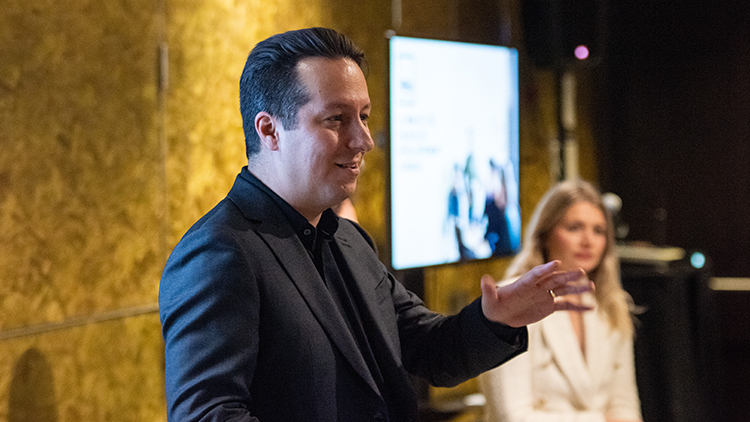
.
MBA graduates from HEC Montréal are trained to become effective leaders who address current and future challenges, including corporate social responsibility, ethics, and sustainable development. These students develop core management skills and discover their personal leadership style through intensive and inclusive collective experience, focused on teamwork. Jean-Michel Champagne (MBA 2017), Sustainable Development Officer and Lecturer at HEC Montréal, and Kevin Johnson, Director of the MBA Program spoke to us about the HEC Montréal MBA program.
There may come a time in your professional journey when you start to feel “constrained by a way of thinking or acting,” says Jean-Michel Champagne. “You might also wonder whether you truly possess the knowledge and skills required for your career development. This is where our MBA program comes in, as it is a way of “reshuffling the cards” in your professional career, and gaining fresh impetus.”
Kevin Johnson expands on this by stating that an MBA is the ideal program to train managers who are able to make informed decisions in a complex and changing world, where over-specialization has become the norm, thus promoting responsible leadership.
According to both men, the School’s MBA program provides a highly intensive collective experience that promotes great teamwork within solid cohorts.
Ranked among the best in the world, this training program also has an internationally renowned faculty and body of research, in addition to a sound and lasting professional network which has developed over many decades. It is “well connected in the economic, political and social ecosystem of Montréal, Quebec, Canada, and even the rest of the world,” says Mr. Johnson.
Moreover, graduates learn not only core business management skills, but also methods of addressing current and future issues, including corporate social responsibility (CSR), ecological transition and sustainable development. “It’s unique to HEC Montréal,” Mr. Johnson declares proudly.

The MBA Program Director doesn’t believe that leadership is an innate quality that we either have or don’t have, but rather something that we can discover and develop. In the MBA program, this is taught, not in a course, but rather through experience, via team projects and hands-on learning leadership journeys. “It is through action and overcoming challenges as a team that we can seize opportunities for development,” he tells us.
In fact, collectives play a significant role in leadership development. “That’s how we discover ourselves as well as our limits,” he states. Throughout their studies, students receive support to help them discover their personal leadership style and work on their weaknesses and strengths. The MBA team helps them reflect on what they are and want to become.
Personal and team evaluations are equally important in measuring leadership. Mr. Johnson explains: “When a good student consistently receives higher grades than her team members, this may reflect a problem of collaboration on her part. That’s why a functional team, with sound and shared leadership, succeeds in enhancing the performance of each of its members.”
To illustrate this type of leadership, he gives us a concrete example of two students who gave remedial sessions to help their colleagues pass their finance exam.
Another objective of an HEC Montréal MBA is “learning how to develop inclusive and responsible leadership”, which takes into account the leadership of others and acknowledges it as such, points out Mr. Johnson. “Our student recruitment process is based on merit, competence, and performance, and it consciously promotes diversity and inclusion. So our graduates are not only very competitive, but also come from very diverse professional and sociodemographic backgrounds. We also take our responsibilities extremely seriously by offering practical workshops on leadership and on equity, diversity, and inclusion (EDI).”
Furthermore, even though collaboration and consultation are at the heart of the learning experience, leadership development is equally important. He explains that “we first learn to make decisions and we then implement them. [That is why] we guide the teams to help them work well. When there are conflicts, we come up with solutions together to resolve them.”

An increasing number of organizations have kept pace with current realities in matters of ecological transition. Mr. Johnson highlights an exponential increase in the number of sustainable development leadership positions. This is why our MBA trains leaders who are able to frame and implement sustainable, socially responsible, and ethical solutions for the productivity of an organization.
According to Mr. Champagne, an HEC Montréal MBA provides training in management, strategy, and finance to specialists in environmental, social and governance (ESG) factors. But it also gives an opportunity to finance specialists to learn the fundamentals of sustainability.
Ultimately, the program will only succeed in providing training to future managers in sustainable management if specialists from various fields can be convinced to pursue it. “I believe we have a social responsibility to make the quality of our MBA available to many more people,” he concludes.
HEC Montréal offers not only full-time, in-person MBA programs in French and in English, but also part-time programs in French. Classes for such programs, also known as hyflex learning, are conducted in real time, two evenings a week, with both in-person and remote attendance options. Face-to-face classes are held on one Saturday a month.
Mr. Johnson observes that part-time students have to juggle their intense professional lives, their courses, and their personal lives. He is constantly impressed by the leadership initiatives taken both remotely and in person, and also by the ability to prioritize what is important in each of these instruction modes.
So, irrespective of whether classes are held remotely or in person, the importance of doing an MBA lies in self-discovery. We learn “at what point we are able to influence, contribute towards, or follow someone else’s leadership,” Mr. Johnson tells us enthusiastically. Failures or errors at work can harm our careers and our professional environment, but these are luxuries we can afford at university. “They don’t matter; we are still in the process of learning,” he concludes.
Share this page:
.
.